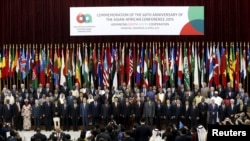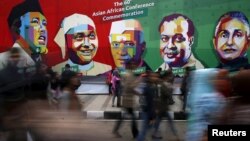At the 60th anniversary of the Asian African Conference in Indonesia, leaders strongly defended principles of self-determination against modern day imperialism but barely mentioned democracy and human rights. The conference marks the anniversary of the gathering in Bandung, Indonesia, that first brought together leaders from many newly independent nations to discuss collective peace, security and economic issues.
Indonesian President Joko Widodo walked side by side with Chinese President Xi Jinping down Bandung’s main street Friday. The leaders of Swaziland, Madagascar, Sierra Leone, East Timor and Zimbabwe also joined in the ceremonial procession to commemorate the 1955 Asian African Conference that gave a united voice to many countries that had recently gained independence from Western colonial powers.
Also in the front of the procession was former Indonesian President Megawati Sukarnoputri, head of President Widodo’s political party and daughter of the late President Sukarno, who organized the 1955 conference.
Bandung principles
At a ceremony at the Merdeka Building museum, where the first conference took place, President Widodo called on leaders from developing nations to renew their commitment to the Bandung principles established 60 years ago.
“Let us reinvigorate our Bandung struggle," he said. "Let’s continue the struggle of our predecessors 60 years ago. We have to increase our tolerance and work towards world peace.”
The 10 Bandung Principles that emerged from that first conference defended a nation’s right of self determination, opposed outside inference in the internal affairs of a sovereign state, and promoted human rights and the peaceful reconciliation of disputes.
Leaders from Zimbabwe, Myanmar, Egypt, and Venezuela also spoke. They were selected to represent different regions of the world but they have also all faced international sanctions for repressing democratic opposition and other dissenting voices in their own countries.
Mugabe lashes out at US, Western countries
Robert Mugabe, the 91-year-old President of Zimbabwe lashed out at the U.S. and Western countries that he says still violate the sovereignty of many nations, through force and financial sanctions.
“Many among us here present can attest to the incessant assaults on our countries sovereignty and on our national economies by the godfathers of the regime change agenda,” he said.
Both the United States and the European Union this year renewed sanctions against top leaders of Zimbabwe’s government. Sanctions were imposed in 2002 over electoral fraud and human rights abuses.
Combating neo-colonialism
Jorge Arreaza, the Vice President of Venezuela, which this year faced new U.S. sanctions over human rights violations and its treatment of the political opposition, said U.S. imperialism must be opposed.
He says today the challenge is aligning the disenfranchised in facing injustice, in fighting the disrespect of sovereignty and in combating neo-colonialism.
Other leaders addressed the major themes of the conference. Egypt's Prime Minister Ibrahim Mahlab spoke out in favor of Palestinian independence.
Myanmar’s President Thein Sein focused on economic development through increased cooperation.








